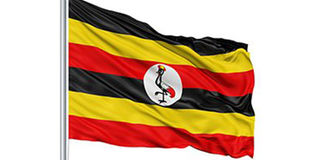What defines a Ugandan?

The Uganda flag. COURTESY PHOTO
What you need to know:
- The issue: Universal definition of a Ugandan.
- Our view: The taxpayer maintains a minister for Ethics and one for National Guidance. But are we all clear on what ethics are to be enforced and how the nation is to be guided?
Life is moving very fast for Ugandans, and it is often defined by contestation and controversy.
No debate is settled in Uganda, from religion to culture and politics. Recently, for instance, leaders of the different religious denominations met with President Museveni and it was reported that the head of State gave them Shs5b.
Cynical members of the public took to social media, radio and television stations to deride the religious leaders, accusing them of conniving with the ruling group to disadvantage Ugandans. The meeting followed public outbursts by Kampala Archbishop Cyprian Kizito Lwanga, accusing intelligence agents of infiltrating the Catholic Church and feeding the President with lies.
On the cultural front, there are tensions between different claimants to thrones in different places, with that of the beleaguered king of the Rwenzururu Kingdom, Charles Wesley Mumbere, now being claimed by a couple of individuals as he remains barred from returning to his kingdom. Elsewhere, you just have to name a kingdom or chiefdom and one will show you divisions and contestations for power and/or authority.
On the political front, the two-decade fallout between President Museveni and Dr Kizza Besigye rages, and the country is split right at the centre between those who want Mr Museveni to rule on and those who want political change. The most efficient arbiter of Uganda’s politics has for long been military force, and so it remains. Perhaps because of what is going on around us, it appears that many Ugandans do not anymore pay attention to the simple but important values like truth, honesty, tolerance, consideration for others, etc.
On the road, for instance, virtually no one wants to give the other way, which on many occasions will require that one stops for a few seconds to let the other pass. It is a common sight on our roads to see motorists competing with pedestrians, virtually allowing them no opportunity to cross the road.
In the midst of all this, and taking into account the plausible view that there is very low belief in institutions, whether public, civil or religious, there is reason to worry about what image young Ugandans are growing up with.
This is why we want to pose the question; what defines a Ugandan? The taxpayer maintains a minister for Ethics and one for National Guidance. But are we all clear on what ethics are to be enforced and how the nation is to be guided?
It appears that a national conversation is needed on how we may come up with a universal definition of a Ugandan. Maybe that will be a good starting point.




